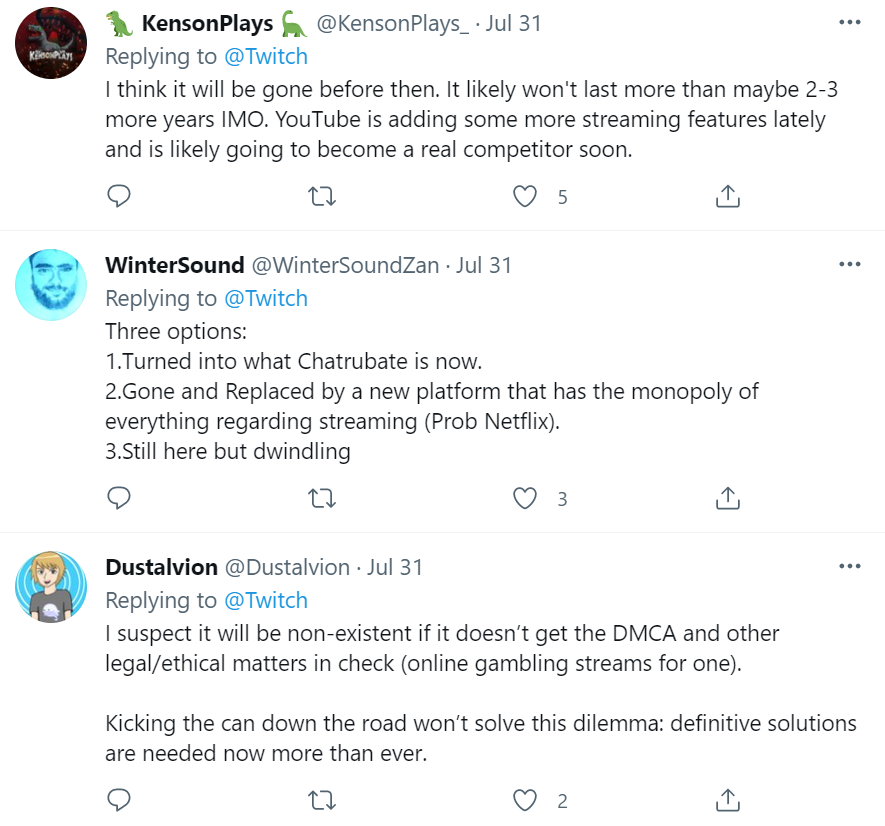On Sunday, Twitch posted this video to both it’s Twitter and Instagram feeds to complete a strand of posts that ran through the month of July to celebrate the tenth anniversary of the streaming sites creation, inviting viewers to respond with how they thought the site may look by the time of it’s 20th birthday in 2031.
Throughout its lifetime Twitch has never been too shy of controversy, especially in recent months as bosses drew criticism on social media for their handling of a trend that saw the sites hub homepage and high traffic ‘Just Chatting’ category filled with ‘hot tub’ streams.
Many commenters complained the content violated and/or took advantage of a loophole in Twitch’s Terms of Service. Twitch’s ultimate solution to the ‘problem’ was to incorporate the content into the existing category for ‘Pools and Beaches’, affording streamers more relaxed rules regarding suitable clothing, particularly for women.
Other recent flairpoints for criticism have included the sites 50/50 revenue split with the majority of its revenue earning content producers – known as ‘Affiliates’, after Facebook announced a more generous split for some of the streamers to its fledgling ‘Gaming’ streaming platform.
DMCA and the foggy future of creator revenue
The use of music and the implications of DMCA has also been a long running point of contention between streamers and the bosses of Twitch, particularly in the last year as the platform has come under greater scrutiny from the legal representatives of the music industry.

More recently, the platform has pressed ahead with a program to introduce regional pricing for channel subscriptions. Whilst this will have the benefit of making the cost of a sub more affordable to viewers in countries that see the changes implemented, Twitch has not made it clear how this will affect the earnings of streamers beyond covering the difference in any revenue lost through the change for three months.
With these and other issues ongoing – and the fact it is literally impossible to keep everyone happy on a platform the size of Twitch, some negative comments are of course to be expected on any post made to the platforms official social media channels.
What really struck me however, was the sheer level of negativity in the responses I scrolled through on both Instagram and Twitter, especially in response to a post that aimed to look at what Twitch could be in years to come. I would have expected – perhaps naively, to have seen a few Partnered Twitch streamers giving a positive vision of how they see the platform improving and growing over the years to come, yet I don’t think I saw one.
Responses indicate sentiment towards Twitch
What I did see were many replies that for the most part fell into three categories of outcome: Nearly every stream will either feature a hot tub or some form of borderline or even actual adult content, that YouTube will soon surpass Twitch as the leading platform for live streaming, or that the site will be shut down completely. The ratio of the responses I saw must have ratioed in the region of 10 posts with a negative outlook for Twitch for each positive one.
Concerningly, that last outcome of Twitch facing the same ultimate fate as Mixer is actually not all that far fetched. Whilst it is true that Twitch earns massive revenue from the sale of channel subscriptions and bits, the bulk of that revenue is earned from a very small percentage of the channels that stream on the platform.
To operate a live streaming service requires a substantial server infrastructure to be available, and whilst Twitch will almost certainly enjoy reduced overheads in this area with Amazon as it’s parent company, Twitch still ultimately has to pay its way and Amazon won’t keep paying the bills if Twitch is actually losing them money. Add in Twitch’s staffing costs, rent and maintenance of several global offices, it soon becomes apparent that Twitch is not the cash printing machine some might be lead to believe.
Whilst the responses to these posts of course only represent a very small snapshot sample of the population that makes up the overall Twitch community, they accurately reflect a sentiment towards Twitch I have felt has been growing for at least a couple of years now: Twitch is not as good as live streaming can be, but because of its dominant position you have to be there until something better emerges. When that something does emerge, it would appear a lot of people will not think twice about leaving for good. It would seem that is something Twitch can ill afford anytime soon.